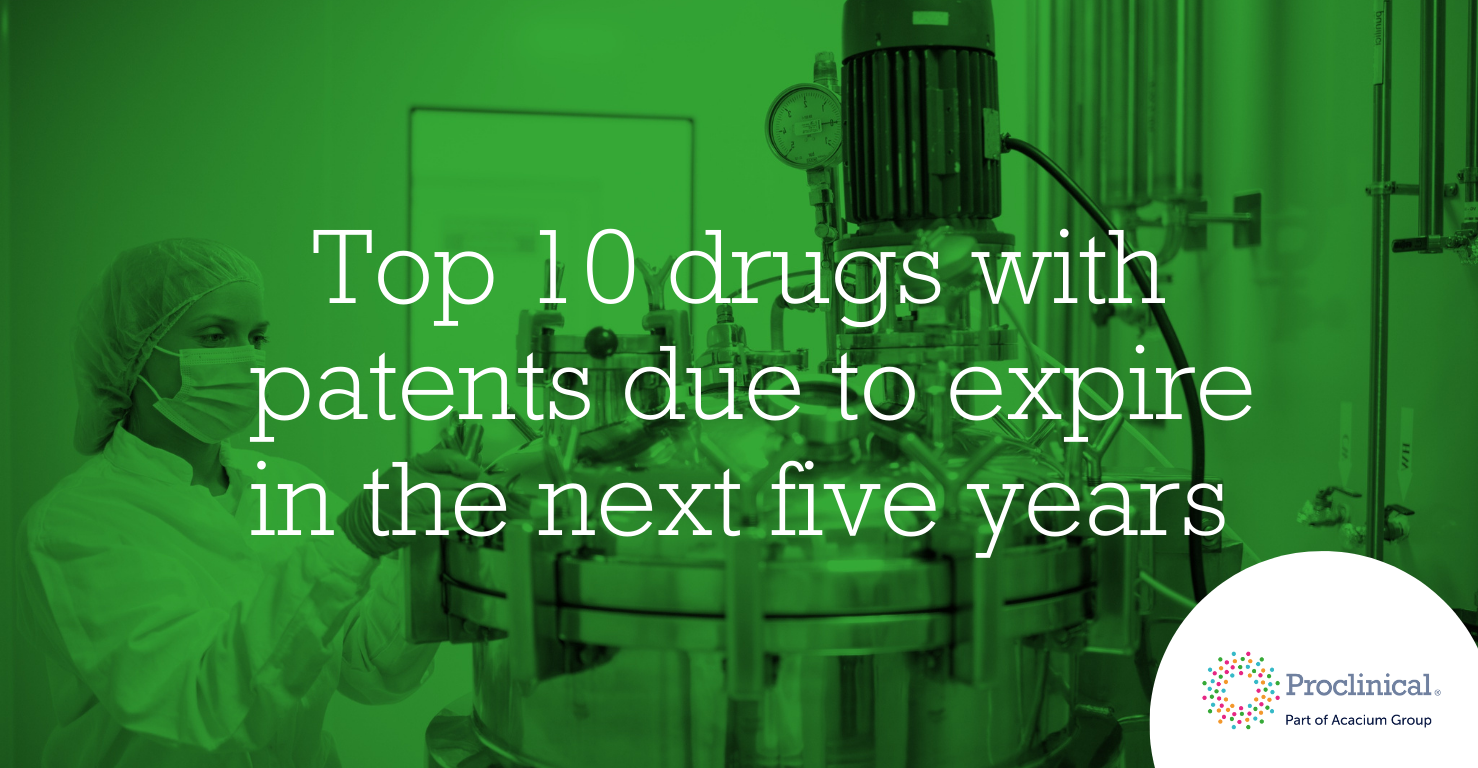.png?v=4d024c233fd53ddcc0af6e3f6f5e3385)
Top 10 drugs with patents due to expire in the next five years
At the start of the last decade, many blockbuster drugs that had powered years of growth were losing patent protection, subjecting the industry’s top players to generic competitors. Now, some of the world’s top pharmaceutical companies are set to face even more of a challenge, with $200,000 billion of revenue at risk in the next 5 years. This is putting pressure on many pharma companies and forcing them to look at new avenues for revenue and growth to continue their important work in driving medical advancements.
Here we round up 10 patent expiries that will impact some of pharma's biggest players in the next 5 years:

1. Keytruda
Company: Merck & Co.
Key patent expiration: 2028
Pembrolizumab, sold under the brand name Keytruda, was first approved by the FDA in 2014 to treat several types of cancer. Since getting the initial green light, Keytruda has been approved for new and expanded uses, including melanoma, non-small cell lung cancer, head and neck cancer, classical Hodgkin lymphoma, urothelial carcinoma, microsatellite instability-high cancers, gastric cancer, cervical cancer, and primary mediastinal B-cell lymphoma.
In 2023, Keytruda accounted for 40% of the company’s pharmaceutical sales making it Merck & Co’s most successful product. Keytruda is on schedule to lose its patent protection in 2028, opening the door to biosimilar competition.
With the loss of exclusivity, Keytruda sales are forecasted to decrease to $27.4bn in 2029, a decline of 19% from $33.7bn in 2028 estimates. To offset a significant fall in revenue, Merck is strengthening its immunotherapy portfolio by building a pipeline of early-stage assets. In addition to this, in early 2024, the company entered a definitive agreement to acquire US Harpoon Therapeutics for $680m which will further advance its oncology portfolio.

2. Eliquis
Company: Bristol Myers Squibb & Pfizer
Key patent expirations: 2027 to 2029
Eliquis (Apixaban) is a medicine used to prevent blood clots in adults. Approved for medical use in the European Union in May 2011, and in the United States in December 2012, Eliquis has become one of the most effective treatment options for DVT and PE.
With Eliquis' patent due to come to an end in the next few years, generic versions of Bristol Myers Squibb and Pfizer’s Eliquis have already secured provisional FDA nods. However, thanks to settlements and a key lawsuit, the pair have been able to fend off those cheaper rivals until at least 2027. This was a relief for Bristol Myers Squibb, which is also set to lose the exclusivity of two of its other star performers, cancer treatments Revlimid and Opdivo. For now, it's unclear when Eliquis generics might start to come in, but it is believed generics wouldn’t come into play until 2027 because of the possibility of a paediatric extension under FDA rules, which would add six months of market exclusivity.

3. Eylea
Company: Regeneron, Bayer
Key patent expirations: 2025 to 2026
Eylea was approved by the FDA in 2011 for wet age-related macular degeneration, diabetic retinopathy plus diabetic and nondiabetic macular edema. In 2023, the Eylea franchise generated sales in the US of $5.9 billion. Experts expect Eylea’s patent life to come to an end in 2025 or 2026, although Regeneron’s financial reporting suggests the company could have more time. In the meantime, big pharma players such as Sandoz and Viatris are already eying up a piece of the market share and working to develop biosimilars.
In the company's 2023 full year results report, Regeneron announced that it had made solid steps to diversify its revenue base and was developing a robust pipeline.

4. Opdivo
Company: Bristol Myers Squibb
Key patent expiration: 2028
Bristol Myers Squibb’s Opdivo (nivolumab) is an immunotherapy drug that is used to treat a number of different cancers. Opdivo doesn’t come close to its rival Merck & Co’s immunotherapy Keytruda in terms of sales, but the drug still generated sales of $9,009 million in 2023. Thanks to some new indications, Opdivo has seen impressive growth in the last few years, with sales up by 9% in 2023 and sales are predicted to reach $11.75 billion by 2026. However, BMS cannot afford to rest on its laurels, and they are set to lose the US market exclusively for Opdivo in 2028. Sydney-based company NeuClone Pharmaceuticals, Swedish firm Xbrane Biopharma and China’s Luye Pharma are already working to develop biosimilars. With the loss of exclusivity for not just Opdivo, but also cancer medication Revlimid and Pfizer-partnered blood thinner Eliquis within the next few years, Bristol Myers Squibb is currently working to launch six new drugs, that together could contribute over $15 billion in sales.

5. Ibrance
Company: Pfizer
Key patent expiration: 2027
Palbociclib, sold under the brand name Ibrance, is a medication developed for the treatment of HR-positive and HER2-negative breast cancer. Pfizer doesn't expect the drug to lose US exclusivity until 2027, but that's not stopping pharma companies from developing their own versions.
In 2019, multiple generic drugmakers notified Pfizer that they had filed for Ibrance copy approvals, arguing that two key patents on the drug are invalid, but Pfizer managed to gain a 4-year extension to 2027. As the lead asset in Pfizer’s oncology portfolio and a growth driver for the entire company, Ibrance is an important brand that Pfizer will fight to protect.
Sales for Ibrance fell in 2023, down 13% operationally driven primarily by lower demand globally due to competitive pressure and lower clinical trial purchases in certain international markets. With the future uncertain for Ibrance, over the last few years, Pfizer has worked hard to bolster its oncology portfolio, including acquiring Array BioPharma, Seagen, and Trillium Therapeutics.

6. Xarelto
Company: Bayer / J&J
Key patent expiration: 2026
Patented in 2007 and approved for medical use in the United States in 2011, Xarelto (Rivaroxaban) is used to treat and prevent blood clots. The anticoagulant, which was jointly developed by Bayer and J&J's Janssen Pharmaceuticals (now Innovative Medicines), has been prescribed more than 80 million times in the US alone. In 2022, it was Bayer’s bestselling pharmaceutical product, bringing in €4,516 million worth of revenue.
Over the years, Bayer has had to protect its patent at a national level in a number of countries and there have already been patent law disputes that have been resolved through settlements. Bayer anticipates it may need to further defend its patent over the coming years but it is expected to lose exclusivity for Xarelto in 2026.
With two of its biggest stars, Xarelto and Eylea both coming up for expiration, Bayer has looked for new growth opportunities and is concentrating on further expanding its development portfolio in the areas of cell and gene therapies.

7. Trulicity
Company: Eli Lilly
Key patent expiration: 2027
Trulicity, which comes in injection form, is used for the treatment of type 2 diabetes in adults and children over the age of 10 years. It works to reduce the risk of major cardiovascular complications in adult patients.
Approved in 2014, Trulicity is protected by a compound patent until 2027, when the floodgates will open to generic completion. After losing patent protections on two of its biggest stars, anti-depressant Cymbalta and osteoporosis treatment Evista, Eli Lilly desperately needed Trulicity to be a success when it was launched 10 years ago. Since then, Trulicity has become one of Eli Lilly's biggest sources of revenue and it was the 17th bestselling drug in the world in 2023.
To offset potential falls in revenue in the next few years, Eli Lilly has focused its efforts on their diabetes portfolio, and in 2022, Mounjaro (tirzepatide), was approved by the FDA to improve blood sugar (glucose) in adults with type 2 diabetes. Since then, it has been approved in Europe and is expected to be a key driver of growth for Eli Lilly over the next decade.

8. Prevnar 13
Company: Pfizer
Key patent expiration: 2026
Pfizer’s Prevnar 13 is a vaccine used to protect against infection caused by 13 strains of Streptococcus pneumoniae bacteria, which can cause pneumonia, meningitis, and other serious illnesses. The immunisation was first introduced for use in infants in late 2009 in Europe and was then approved by the FDA in February 2010. In 2015, the pharmaceutical giant got a healthy revenue boost, when the US federal government recommended the vaccine for people older than 65 and required insurance to cover it.
The patent for Prevnar 13 is expected to come to an end in 2026, this will be another blow for Pfizer after recently having to overcome the patent expiries for Lyrica, Lipitor and Viagra. To compensate for patent losses the company has invested heavily into R&D and secured seven FDA nods in 2023, as well as strengthening their oncology portfolio with the acquisition of Seagen Inc. in December 2023.

9. Ocrevus
Company: Roche
Key patent expiration: 2028
Ocrelizumab, sold under the brand name Ocrevus, is used to treat adults with relapsing or early primary progressive multiple sclerosis. First approved in 2017, its US patent is due to run out in 2029 and will also expire in 2028 in Germany, France, Spain, the UK, and Italy. Many life science companies are competing to develop a biosimilar for omalizumab, including South Korean biopharma, Celltrion, who announced in 2023 that they had received phase 3 approval.
In 2023, Roche’s Ocrevus brought in CHF 6,381 million in revenue, making it the company’s best-selling pharmaceutical product. With the looming patent expiry, Roche remains focused on its pipeline and recently announced very promising results for its new breast cancer treatment, inavolisib. The company have also invested in new partnerships and acquisitions to strengthen its portfolio in areas like inflammatory bowel disease and cardiometabolic disease, putting Roche in a promising position for future growth.

10. Prolia/Xgeva
Company: Amgen
Key patent expiration: 2025 to 2026
Approved by the FDA in 2010, Prolia/XgevaIt (Denosumab) is a treatment for secondary bone cancer. It helps to strengthen the bones and prevent fractures for some types of cancer. In some parts of Europe, Prolia/Xgeva has already lost its patent protection, and it is due to expire in major markets such as the US, France, Italy, Spain and the UK between 2025 and 2026. Amgen is no stranger to costly patent expiries, and in the last few years, the company has had to take steps to offset losses from white blood cell booster, Neulasta and anemia medicine, Epogen. In 2023, the company generated solid YOY growth, with sales up 9% and expects to remain in a good position thanks to its robust pipeline.
IS YOUR PHARMACEUTICAL COMPANY AIMING TO GROW THIS YEAR?
At Proclinical Staffing, we work with a number of leading global pharmacuetical companies. Our dedicated pharmaceutical recruitment team are specialists in sourcing skilled and experienced professionals to fill a wide variety of roles across all areas of the pharma industry, including biotech, genomics, vaccines, generics, biosimilars, and OTC medicines. Find out more about our range of workforce solutions and how we can help your business grow globally.
INTERESTED IN WORKING FOR ONE OF THE TOP PHARMA COMPANIES?
At Proclinical Staffing, we are specialists in recruiting for all types of pharmaceutical jobs. If you’re looking for a new position, simply send us your CV or use our job search tool to find the right role for you.

.png)

.png)


.png)
.png)




.png)
.png)












